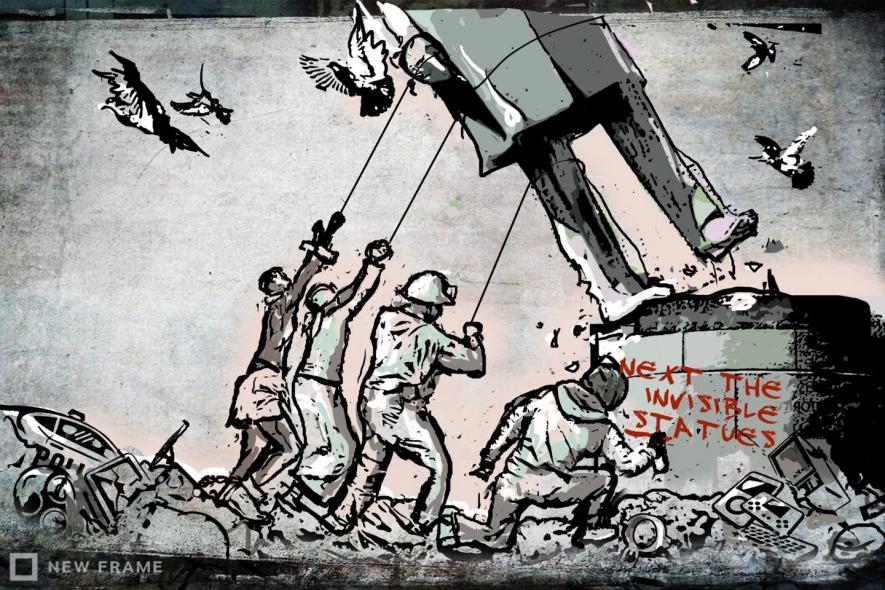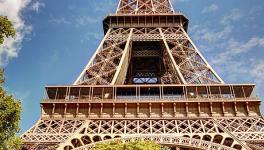The Toppling of Racist Statues is Historical Poetry

Illustrator: Anastasya Eliseeva
The rebellion that began in Minnesota in the wake of the police murder of George Floyd quickly acquired a national and international reach. Initially focused on policing, a project inextricably entwined with racism in the United States, it soon acquired a wider anti-racist focus. One aspect of this has been that, in a number of countries, statues of notorious racists have been defaced, decapitated and pulled down. In many cities, municipal authorities have followed the spirit of a popular upsurge and moved quickly to take down statues of people now widely recognised to have been on the wrong side of history.
In Bristol, England, a crowd animated with a sense of the joy of the carnival brought down the statue of Edward Colston and rolled it into the harbour. Colston had been a powerful figure in the capture, enslavement and trade in African people. He was a member of the Royal African Company from 1680 to 1692, including a stint as its deputy governor.
During Colston’s time at the company, it is estimated to have taken about 84 000 people from Africa. Around 19 000 of them joined the two million souls whose lives were taken at sea during the horrors of the Middle Passage, the forced crossing from Africa to the Americas. The survivors were enslaved on plantations in the Caribbean and the Americas.
‘A famous day’
The scenes at the Bristol harbour on Sunday 7 June had a sense of being a contemporary iteration of a long history of revolt. As historians Peter Linebaugh and Marcus Rediker show in their book, The Many-Headed Hydra, in the 17th century – Colston’s time – the docks became key sites at which information was shared and revolt organised across the Atlantic world by a “motley crew” of women and men with roots in Europe, Africa, the Caribbean and the Americas.
The elites of the day, men like Colston, imagined themselves as the Greek mythic hero Hercules and the “motley crew” as the monstrous serpent, the many-headed Hydra. As they crushed one head, perhaps a revolt on a slave ship, another would emerge on a plantation, and then another in a tavern on the docks. The brutality that they mobilised to try and destroy the Hydra, to finally cut off all its heads, took the form of unspeakable horrors.
Bristol mayor Marvin Rees, the son of a Jamaican migrant, described the rolling of the Colston statue into the harbour as “historical poetry”. Street artist Banksy called it “a famous day”. Pioneering musical collective Massive Attack, with its roots in Bristol, welcomed the actions of the crowd. London mayor Sadiq Khan swiftly announced plans to review statues, street names, and the names of public buildings and plaques with the aim of removing those with links to slavery.
But responses were not uniformly positive. British Prime Minister Boris Johnson described the removal of the statute as “a criminal act”. Priti Patel, his home secretary, described it as “utterly disgraceful”. All the old alibis for the ongoing legitimation of racist forms of public memorialisation were rolled out. It was said that Colston had been a philanthropist. It was said that he was a man of his time and that he should not be judged by the standards of today. It was said that the statute had aesthetic merit and was an important historical artefact required to enable an accurate memory of the past.
Each of these hackneyed arguments is nothing but an alibi for people who wish to sustain a complicity with the symbolic authority of racism without being called racist. Among the people who came to be counted as white in the 17th century, there were always some who opposed slavery and some who threw in their lot with the oppressed. The fact that they were a minority, and often considered mad or criminal by official opinion, does not change the fact that their moral compass enabled them to see what people like Colston refused to see. People like Gerrard Winstanley, Benjamin Lay, Edward Despard, William Blake, Thomas Paine and others stand as a plain and permanent rebuke to the canard that inhabiting a particular society at a particular time condemns one to accept the dominant ideas of that society at that time.
Stepping stones
No credible protagonist in the debates about officially sanctioned forms of public memory would argue that a statute of Adolph Hitler or Joseph Goebbels would be an appropriate way to remember German fascism and its crimes in a city like Berlin. On the contrary, the interventions in that city into the public memory of fascism include the Holocaust Museum, the Holocaust Memorial and the Stolpersteine or stumbling stones, brass plates set into the pavements outside the homes where people murdered by fascism lived. The Stolpersteine carry the names of the dead and the dates of their birth, deportation and death. One cannot inhabit Berlin without being constantly jolted into memory of the horrors that unfolded in the city.
Until Sunday, the flow of everyday life in the otherwise convivial space around the Bristol Harbour moved around an official memorialisation entirely different to that in Berlin. The only explanation for this disjuncture is that the victims of German fascism are now counted as full and equal human beings by the German state. The squandering of their lives and the sickening sadism that accompanied the loss thereof is counted as a crime that requires public remembrance. There is no city anywhere in England, or any of its settler colonies, in which there is an equivalent accounting for the worldwide crimes of English colonialism.
We must recall that the actions of a figure like Colston were not undertaken at the margins of English society. Colston was a powerful figure venerated for almost 300 years after his death. His involvement in enslavement did not run against the grain of English liberalism, which would become the official ideology of British imperialism at the height of its power. Locke, the first great philosopher of English liberalism and a contemporary of Colston, owned stock in the Royal African Company. He wrote The Fundamental Constitutions of Carolina (1669), which legislated African enslavement.
The claims to civilisational superiority animating Italian and German fascism were shattered in military defeat. But the broader claim to the civilisational superiority of Europe and its settler colonies has not suffered a defeat of that magnitude. There is a particularly English current of this claim that continues to fester in England and across its settler colonies. It is often explicitly asserted in conservative thought and implicitly sustained in all kinds of other thought and practice, ranging from how schools are run to who is and is not remembered as a worthy historical figure.
Yet Rhodes remains
In South Africa, Afrikaner nationalism, with its ties to German fascism, was rendered illegitimate at the end of apartheid. Interventions into official memory often confined themselves to the period in which the country was ruled by Afrikaner nationalism. The fact that the period from 1948 to 1994 was a relatively brief moment in colonial history was often obscured and there was often little accounting for the crimes of English liberalism across southern Africa.
For 25 years, no credible protagonist in the public sphere has demanded the right to publicly affirm the memory of the “architect of grand apartheid”, Hendrik Verwoerd. But it was only two years ago that it was deemed necessary to change the name of Grahamstown to Makhanda. John Graham, the British army officer after whom the town was named, drove the Xhosa people off the land on which the town sits between 1811 and 1812 by burning their homes, destroying their crops and killing any man that resisted. The governor of the Cape Colony reported to the British cabinet that Graham had forced the Xhosa across the Fish River with “a proper degree of terror”.
Today the university in that town continues to carry the name of English imperialist Cecil John Rhodes, who wreaked destruction across southern Africa on a world historical scale and laid many of the structural foundations for the forms of racial domination and exclusion that continue to structure the present. In 1887, Rhodes – speaking in the precise spirit of the liberalism of the day and with clear echoes of an infamous phrase in the liberal philosopher John Stuart Mill’s 1859 essay, On Liberty – told the colonial parliament in Cape Town that “we must adopt a system of despotism in our relations with the barbarians of South Africa”.
We still live in the long shadow of that project. Some of us continue to be murdered by the state in the shadow of that project.
As statues of Confederate generals and English slavers come down at the pace of falling dominoes, the entwinement of the English claim to civilisational superiority and liberalism, its legitimating philosophy, with African enslavement and dispossession is edging closer to a historical reckoning on a planetary scale. If we end this year with a university still named in honour of Rhodes there will have been a dispiriting failure to grasp the historical weight of the moment.
Get the latest reports & analysis with people's perspective on Protests, movements & deep analytical videos, discussions of the current affairs in your Telegram app. Subscribe to NewsClick's Telegram channel & get Real-Time updates on stories, as they get published on our website.
























